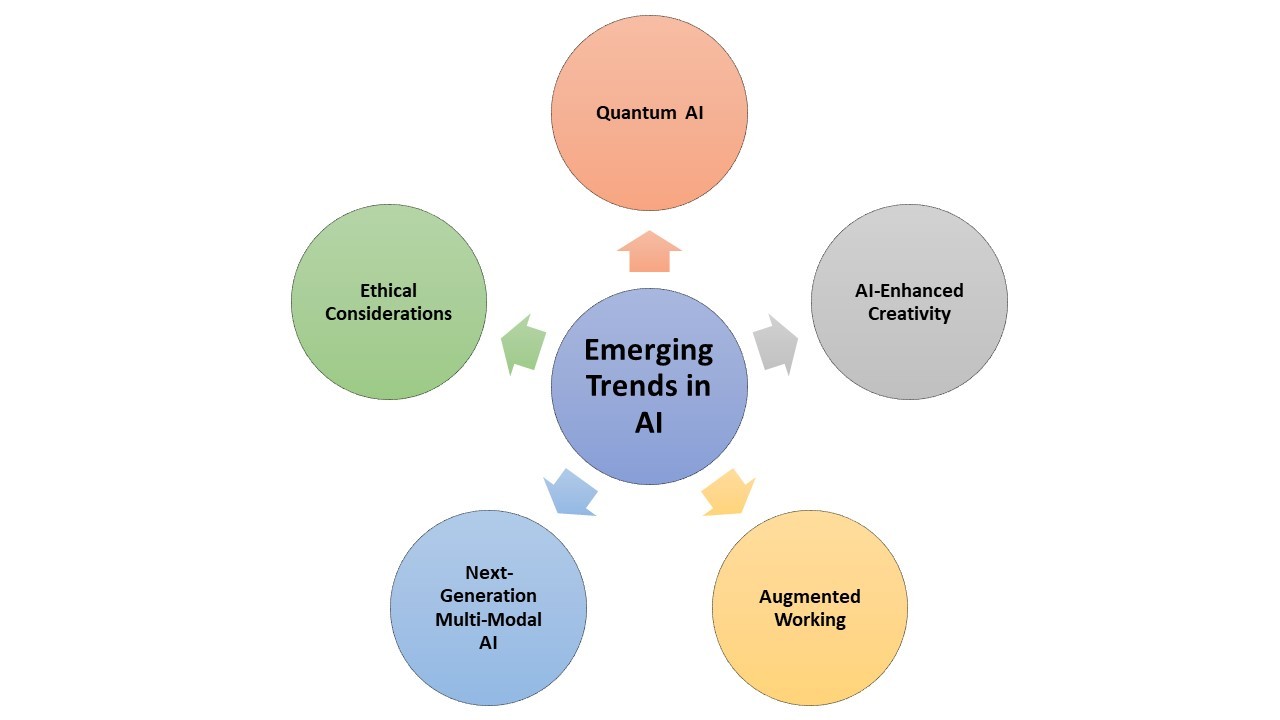
Stepping into the year 2024, the landscape of artificial intelligence (AI) continues to evolve at an unprecedented pace, presenting both exciting opportunities and formidable challenges. In this era of technological advancement, we find ourselves at the intersection of innovation and responsibility, where emerging trends in AI are reshaping industries and influencing the way we live and work.
As we explore the future of AI, several compelling trends come to the forefront, each poised to leave a significant impact on technology and society. These trends include the promises of Quantum AI, the infusion of AI into creative processes, the transformation of work through augmented capabilities, the evolution of multi-modal AI, and the increasing emphasis on ethical considerations.
Emerging Trends:
- Quantum AI: Quantum computing promises to solve problems intractable for classical computers, enabling the development of more powerful and efficient AI models. Potential applications include drug discovery, materials science, and climate modeling. Requires significant hardware and software advancements.
- AI-Enhanced Creativity: AI algorithms will assist humans in creative endeavors like art, design, and writing. Tools will generate new ideas, personalize experiences, and create unique artistic expressions. Raises concerns about artistic originality and ownership.
- Augmented Working: AI will automate repetitive tasks, freeing humans for higher-order thinking and collaboration. Tools will support project management, decision-making, and communication. Requires careful planning to minimize job displacement and ensure a smooth transition.
- Next-Generation Multi-Modal AI: AI models will understand and process diverse data modalities like text, images, and audio. This will lead to more natural and intuitive human-computer interactions. Requires advances in data fusion, representation learning, and multi-modal architectures.
- Ethical Considerations: Increasing focus on ethical considerations like data privacy, algorithmic bias, and potential misuse. Development of guidelines and regulations for responsible AI development and deployment. Transparency and accountability are crucial for building trust in AI.
Challenges and Risks:
- Data Bias and Fairness: AI models can amplify existing biases in data, leading to discriminatory outcomes. Techniques need to be developed for ensuring fairness and accountability in AI systems. Requires diverse training data and robust bias detection algorithms.
- Explainability and Transparency: Understanding how AI models make decisions is often difficult, hindering trust and accountability. Methods need to be developed for explaining AI decisions in a human-understandable way. Interpretable AI models and explainable AI frameworks are crucial.
- Job displacement: Automation by AI can lead to widespread job displacement, particularly in routine tasks. Strategies for retraining and reskilling workers are essential. Investing in education and lifelong learning programs is crucial.
- Security and Privacy: AI systems are vulnerable to attacks that can compromise data privacy and security. Robust security measures need to be developed to protect against malicious use of AI. Secure hardware and software, along with cybersecurity awareness, are essential.
- Global AI Governance: As AI adoption accelerates globally, coordinated efforts are needed for responsible development. International standards and regulations need to be established for ethical AI governance. Collaboration between governments, industry leaders, and researchers is key.
Navigating the Future:
- Investing in AI education and training: Equipping individuals with the skills and knowledge needed to understand, develop, and utilize AI responsibly. Educational programs and training initiatives should be accessible to all.
- Prioritizing ethical AI development: Establishing clear ethical guidelines and best practices for AI development and deployment. Ensuring transparency, accountability, and fairness in AI systems. Building public trust through responsible AI development.
- Fostering collaboration: Addressing the challenges of AI requires collaboration between researchers, policymakers, industry leaders, and the public. Open dialogue and information sharing are essential. Fostering an inclusive and collaborative AI ecosystem is crucial.
- Promoting open-source AI: Open-source platforms can accelerate AI progress and ensure transparency and accessibility. Sharing knowledge and resources can benefit the entire AI community. Building open-source AI repositories and tools is important.
- Investing in AI research: Continued research and development are essential for pushing the boundaries of AI and unlocking its full potential. Funding for basic and applied AI research is crucial. Supporting diverse research teams and promoting international collaboration is important.
By embracing emerging trends and addressing potential challenges, we can leverage AI for a better future. Building a responsible, ethical, and inclusive AI ecosystem is essential for ensuring that this powerful technology benefits all. As we navigate the AI horizon, let us strive to create a future where AI empowers humanity and builds a more equitable and sustainable world for all.
Ahmed Banafa’s books
Covering: AI, IoT, Blockchain and Quantum Computing
Also Read:
AI and Machine Unlearning: Navigating the Forgotten Path








A Century of Miracles: From the FET’s Inception to the Horizons Ahead